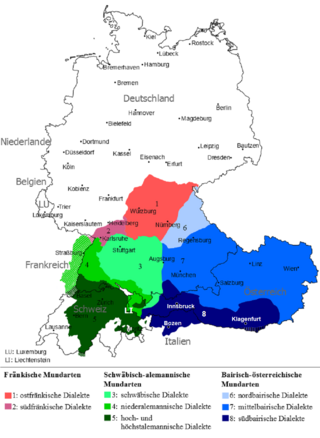This is an old revision of this page, as edited by Sarcelles (talk | contribs) at 22:06, 13 November 2024 (→Grouping: ''Older sources give the following grouping'' is a weasel word, see also https://commons.wikimedia.org/Commons:Village_pump#Long-term_disputes_on_various_wikis_involving_a_cross-wiki_IP_author). The present address (URL) is a permanent link to this revision, which may differ significantly from the current revision.
Revision as of 22:06, 13 November 2024 by Sarcelles (talk | contribs) (→Grouping: ''Older sources give the following grouping'' is a weasel word, see also https://commons.wikimedia.org/Commons:Village_pump#Long-term_disputes_on_various_wikis_involving_a_cross-wiki_IP_author)(diff) ← Previous revision | Latest revision (diff) | Newer revision → (diff) DialectThis article has multiple issues. Please help improve it or discuss these issues on the talk page. (Learn how and when to remove these messages)
|
| East Franconian | |
|---|---|
| Fränggisch Standard High German: Ostfränkisch, Fränkisch | |
| Native to | Germany (Bavaria, Thuringia, Saxony, Baden-Württemberg, Hesse) |
| Native speakers | 4,900,000 (2006) |
| Language family | Indo-European |
| Early forms | Proto-Indo-European
|
| Writing system | Latin (German alphabet) |
| Language codes | |
| ISO 639-3 | vmf |
| Glottolog | main1267 |
| Linguasphere | 52-ACB-dj |
 1: East Franconian 1: East Franconian | |
 East Franconian is classified as Vulnerable by the UNESCO Atlas of the World's Languages in Danger East Franconian is classified as Vulnerable by the UNESCO Atlas of the World's Languages in Danger | |
East Franconian (German: Ostfränkisch [ˈɔstfʁɛŋkɪʃ] ), usually referred to as Franconian (Fränkisch [ˈfʁɛŋkɪʃ] ) in German, is a dialect spoken in Franconia, the northern part of the federal state of Bavaria and other areas in Germany around Nuremberg, Bamberg, Coburg, Würzburg, Hof, Bayreuth, Meiningen, Bad Mergentheim, and Crailsheim. The major subgroups are Unterostfränkisch (spoken in Lower Franconia and southern Thuringia), Oberostfränkisch (spoken in Upper and Middle Franconia) and Südostfränkisch (spoken in some parts of Middle Franconia and Hohenlohe).

In the transitional area between Rhine Franconian in the northwest and the Austro-Bavarian dialects in the southeast, East Franconian has elements of Central German and Upper German. The same goes only for South Franconian German in adjacent Baden-Württemberg. East Franconian is one of the German dialects with the highest number of speakers.
The scope of East Franconian is disputed, because it overlaps with neighbouring dialects like Bavarian and Swabian in the south, Rhine Franconian in the west and Upper Saxon in the north.
East Franconian is researched by the "Fränkisches Wörterbuch" project in Fürth, which is run by Bayerische Akademie der Wissenschaften and Erlangen-Nuremberg University.
Grouping
East Franconian is subdivided in multiple different ways.
One view differentiates three major sub-dialects:
- Ostfränkisch (East Franconian)
- Oberostfränkisch (Upper East Franconian): in the Würzburger Übergangsstreifen, Regnitz-Raum Obermain-Raum, Bayreuther-Raum, Obermain-Raum, Bayreuther-Raum, Nailaer-Raum, Plauener-Raum
- Unterostfränkisch (Lower East Franconian): in the Würzburger-Raum, subdivided in a Northern and Southern part, Coburger-Raum, Henneberger-Raum, Reußischer-Raum
- Südostfränkisch (South East Franconian)
Another view differentiates two major sub-dialects:
- Ostfränkisch (East Franconian): in Franken and a part of Baden-Württemberg with Wertheim and Tauberbischofsheim and also in the Vogtland
- Unterostfränkisch (Lower East Franconian): in Unterfranken and in the Coburger and Henneberger Raum
- Oberostfränkisch (Upper East Franconian): in Ober- and Mittelfranken
A third view has:
- Ostfränkisch (East Franconian)
- Unterostfränkisch (Lower East Franconian)
- Hennebergisch: around Meiningen – Suhl – Schmalkalden
- engeres Unterostfränkisch (Lower East Franconian in a stricter sense): hohenlohischer Raum, Würzburger Raum
- Würzburgisch: in the Würzburg area (Würzburger Raum)
- area between Unterostfränkisch and Oberostfränkisch: Ansbacher-, Neustädter- und Coburger Raum
- Oberostfränkisch (Upper East Franconian): Regnitz-, Hof-Bayreuther-, Obermain-, Nailaer- und vogtländischer Raum
- Vogtländisch (= Ostfränkisch-Vogtländisch): vogtländischer Raum
- Unterostfränkisch (Lower East Franconian)
See also
- Franconia
- Eberhard Wagner, German regional dialect researcher, in the dialect of Upper Franconia (East Franconian German).
References
- Gerhard Fink and Langenscheidt-Redaktion (ed.), Langenscheidt Lilliput Fränkisch, Langenscheidt: München, 2018, p. 339: "Fränkisch is Fränggisch"
- East Franconian at Ethnologue (18th ed., 2015) (subscription required)
- Erich Straßner: Nordoberdeutsch. In: Lexikon der Germanistischen Linguistik. Herausgegeben von Hans Peter Althaus, Helmut Henne, Herbert Ernst Wiegand. 2nd ed., Max Niemeyer Verlag Tübingen, 1980 (1st ed. 1973), p. 479ff., here p. 481
- Hermann Paul: Mittelhochdeutsche Grammatik. 25. Auflage neu bearbeitet von Thomas Klein, Hans-Joachim Solms und Klaus-Peter Wegera. Mit einer Syntax von Ingeborg Schöbler, neubearbeitet und erweitert von Heinz-Peter Prell. 25th ed., Max Niemeyer Verlag, Tübingen, 2007, p. 7
- Peter Wiesinger: Die Einteilung der deutschen Dialekte. In: Dialektologie. Ein Handbuch zur deutschen und allgemeinen Dialektforschung. Herausgegeben von Werner Besch, Ulrich Knoop, Wolfgang Putschke, Herbert Ernst Wiegand. Zweiter Halbband. Volume 1.2 of Handbücher zur Sprach- und Kommunikationswissenschaft (HSK). Walter de Gruyter, Berlin / New York, 1983, p. 807ff., here p. 842–846 (sub-chapter: Das Ostfränkische) and p. 862
External links
- Linguistic atlas of Middle Franconia (in German)
- Linguistic atlas of Lower Franconia (in German)
- Bayerische Akademie der Wissenschaft (in German)